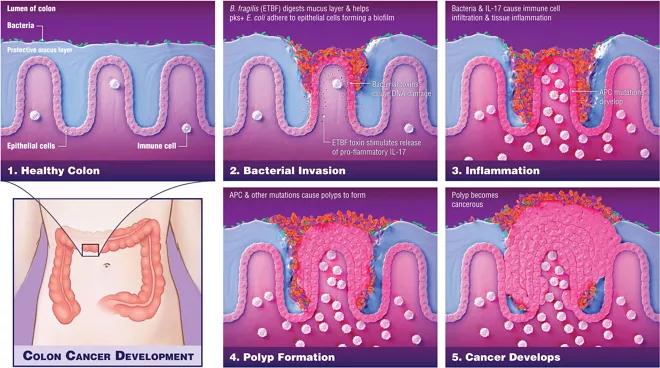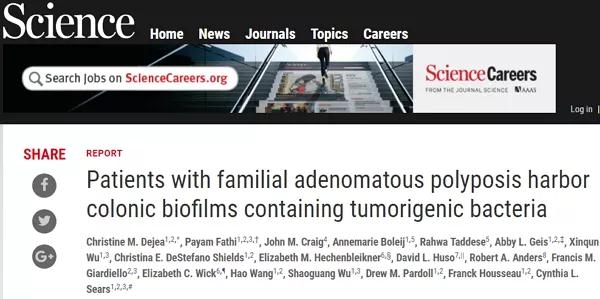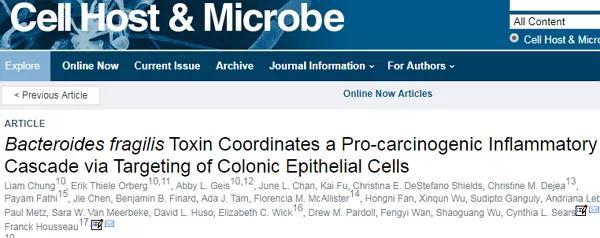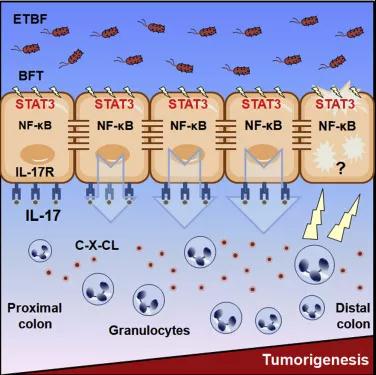Release date: 2018-02-06
"There are two types of bacteria in the colon that promote chronic inflammation and increase the risk of colon cancer." This is the latest conclusion of two articles published in the journals Science and Microbe in early February. The scientists delved into the mechanisms behind the "specific bacteria-induced tumorigenesis" and found key molecules.

The process by which bacteria induce colon cancer (Source: Elizabeth Cook)
Both articles are the latest in the team of Professor Cynthia Sears at the Johns Hopkins Bloomberg-Kimmel Institute. They found two types of bacteria in the colon tissue of patients with hereditary colorectal cancer and confirmed that they are the main "push" to advance cancer.
Specifically, the two types of bacteria invade the protective mucus layer of the colon and “collect†each other to create an environment suitable for microbial survival. These invasive behaviors can cause chronic inflammation and DNA damage. Moreover, bacteria can stimulate specific immune responses and further promote tumor formation.
Science reveals two types of bacteria that increase the risk of cancer

Image source: Science (DOI: 10.1126/science.aah3648)
Often, most bacteria cannot pass through the protective mucus layer of the intestine. However, early research by the Cynthia Sears team showed that at least half of colon cancer patients (no genetic predisposition) had specific bacteria that could invade colonic mucus. Moreover, these bacteria form viscous biofilms near the colonic epithelial cells. The researchers speculate that these bacteria will eventually stimulate epithelial cell carcinogenesis.
About 5% of colon cancer patients are caused by familial adenomatous polyposis (FAP), and this genetic mutation eventually leads to the development of epithelial cells into malignant tumors. To investigate the relationship between bacterial biofilm formation and cancer development, the Cynthia Sears team analyzed colon tissue from six FAP patients. The results showed that about 70% of patients had flaky biofilm distributed on the colon surface.
Using genetic probes to identify bacterial species, the researchers found that biofilms are mainly composed of two types of bacteria—Bacteroides fragilis and Escherichia coli. This result is surprising because the colon contains at least 500 different types of bacteria.
Subsequently, the researchers analyzed 25 tissue samples from FAP patients and found that one of the major bacteria that make up the biofilm is a subtype of Bacteroides fragilis called ETBF, which secretes a toxin that triggers colonic inflammation. Promote cancer.
At the same time, E. coli secretes a toxin, colibactin (encoded by the "PKS" gene island sequence in the E. coli genome), which damages epithelial DNA.
It is worth noting that only the presence of these two types of bacteria will increase the risk of tumorigenesis. This suggests a synergy between the two bacteria.
Cell Host & Microbe: The mechanism by which bacteria induce cancer

Image source: Cell Host & Microbe (DOI: https://doi.org/10.1016/j.chom.2018.01.007)
In 2009, the Cynthia Sears team published a paper in the journal Nature Medicine revealing that a unique immune response (producing the inflammatory protein IL-17) is the key to ETBF bacteria-induced tumor formation. This type of immune response is in stark contrast to anti-tumor immune responses, which promote tumor formation.
To demonstrate the effect of IL-17 on bacterial-induced tumors, the team knocked out the mouse gene encoding the IL-17 protein and subsequently implanted ETBF and E. coli (PKS+E) into the mouse colon. The results showed that colonic cancer did not occur in mutant mice compared to mice expressing IL-17 protein. This suggests that IL-17 protein is essential for bacterial induction of tumors.
In addition, the study also showed that ETBF is responsible for digesting the mucus layer, prompting E. coli to invade the intestinal mucosa, resulting in increased DNA mutations in epithelial cells, thereby increasing the risk of colon cancer. The specific reaction is as follows:
First, toxins stimulate colonic immune cells to express IL-17 protein. This inflammatory molecule acts directly on colonic epithelial cells, further activating a protein complex NFkappaB involved in inflammation.
Subsequently, NFkappaB will in turn induce colonic epithelial cells to produce corresponding signaling molecules that are responsible for recruiting more immune cells to colonize the colon tissue. These immune cells are involved in the inflammatory response and promote tumor growth.
This series of reactions will eventually increase the probability of colon cancer. In addition, the researchers confirmed that STAT3 protein (functioning in inflammation, cancer) is also essential for colon cancer.

Image source: Cell Host & Microbe
Significance
At present, colonoscopy for the detection of polyps is the standard for the diagnosis and treatment of colon cancer. Routine colon cancer screening is recommended once every 10 years. These results now remind that people with both types of bacteria should be screened for higher frequency cancer.
If further research indicates that biofilms occur before polyps, future biofilm detection or analysis of specific bacteria is expected to be an effective means of early screening for colon cancer. These two studies have also provided new ideas for colon cancer prevention, such as changing the structure of the flora, developing drugs or vaccines against protein toxins.
Source: Bio-Exploration
We will provide many kinds of medical disposables, for example:
Transfusion Disposable Products
Cardiology Disposable Products
Infusion Disposable Products
Surgical Medical Gloves
Plastic Scissors
Plastic Mouth Piece for Endoscopes
Urology Disposables Products
Anaesthesia Disposable Products
General Surgery
Gynaecology and Paediatric Disposable Products
Non Woven Disposable Products
Surgical Blades & Scalpels
Blood Collection Tubes
Plastic Vaginal Speculum
Waste Management
Plastic Sponge Holder
Plastic Tweezers
Gastro Entrology Disposable Products
Surgical Dressings
Laryngeal Mask
Tube with Swab
ECG Electrodes
Maternity Pads
Blood Bag Systems
General Disposables
-
General Medical Disposables,Medical Mask,Medical Gauze,Medical Syringe
NOUVASANT GROUP LTD. , https://www.nouvasant.com